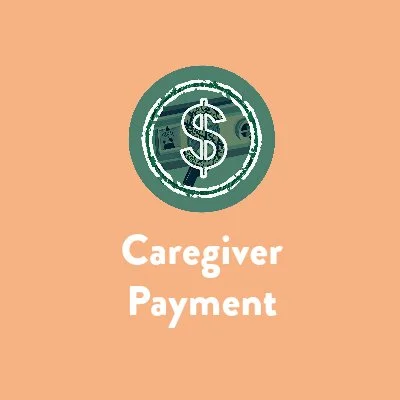State-By-State Family Caregiver Pay Rate Guide
PAID.CARE’S ULTIMATE GUIDE
At Paid Care, we help family caregivers get paid for the care they give at home. Many states offer pay through Medicaid and other health care programs. On average, family caregiver pay rates range from $13 to $21 per hour, depending on location, Medicaid waiver rules, and type of care provided.
If you're supporting a loved one with activities of daily living, you may qualify for payment, employment benefits, and insurance coverage. This guide explains how caregiver pay works, what programs are available, and how Paid Care can help you start getting paid.
SECTIONS
Browse Directory By State:
Louisiana
Maine
Minnesota
Mississippi
Montana
Nebraska
Nevada
New Hampshire
New Jersey
New Mexico
North Dakota
Ohio
Oklahoma
Oregon
Rhode Island
South Dakota
Texas
Utah
Vermont
Virginia
Washington
Washington, D.C.
West Virginia
Wyoming
Family Caregiver Pay Rate Basics
Family caregiver pay rate depends on state programs, health needs, and hours of care. Some states offer hourly payment through Medicaid waivers, while others reimburse care through Medicare Advantage or insurance policy benefits.
Paid Care evaluates your eligibility, confirms pay rates, and assists with documentation to ensure caregivers receive proper wage payments.
How Medicaid Supports Family Caregivers
Medicaid offers financial support for in-home care through waiver programs. These programs allow payment to family caregivers instead of paying for care in a nursing home.
Eligibility depends on the recipient’s income, health, and need for daily care. Paid Care helps complete the required background check and paperwork to enroll you in these programs.
Income, Payment, and Taxes for Caregivers
Caregiver payment is considered income and may be subject to income tax. You must report caregiver wages on your tax return each year.
Some caregivers receive reimbursement through Medicaid or a Medicare Advantage plan. Paid Care offers tools and financial guidance to manage taxes and employment records.
Employee Benefits for Paid Caregivers
When caregivers are paid as employees, they may qualify for employee benefits. These may include health insurance, overtime pay, and sick leave.
Policies differ by program and state. Paid Care helps you understand which benefits apply and supports you in tracking hours and health documentation.
Health Insurance, Medicare, and Policy Coverage
Caregivers may receive health insurance through Medicaid or an insurance policy linked to their employment. Some Medicare programs may also cover health care and medication costs for the care recipient.
Paid Care helps explain your options, whether through Medicaid, Medicare Advantage, or private insurance. We make sure you meet policy requirements for coverage and care services.
Home Care and Activities of Daily Living
Family caregivers often provide support with bathing, dressing, mobility, and meals. These activities of daily living are central to home care and usually qualify for pay under Medicaid or insurance programs.
With Paid Care, you can track these services, log each hour, and ensure you’re paid according to your state’s caregiver pay rate.
Veterans VA Caregiver Programs
Veterans Directed Home and Community Based Services
Veterans Directed Home and Community Based Services, often referred to as VD-HCBS or informally as Veterans Directed Care, is available to veterans enrolled in the VA health care system requiring "nursing home level care." Under the va caregiver support program, veterans have the flexibility to choose their care providers, including family members who can offer personal care services.
Adult Children Can Be Paid Caregivers for Veterans.
Wondering how much you might get paid as an adult child caring for a veteran? The Veterans Health Administration (VA) sets hourly rates for home care, adjusted for your area's cost of living. This means the pay can vary depending on location.
While the exact amount depends on the veteran's needs, expect a range of $8.50 to $20.00 per hour.
Considering Aid & Attendance or Housebound Pensions? A VA Pension planning expert can help you understand your eligibility, determine the best approach, and maximize your potential benefits.
Veteran’s Aid & Attendance and Housebound Pensions
The Veterans' Aid & Attendance and Housebound Pensions are specialized programs for wartime veterans and spouses. Navigating these programs to pay individuals, including adult children caring for aging parents, involves understanding the pension's dependency on current non-pension related income.
Reduce Your Income Taxes While Caring for a Veteran
The Department of Veterans Affairs offers a valuable benefit for families caring for veterans at home. You may be able to deduct all care-related expenses from your taxable income. This includes costs associated with:
Private caregivers: If you hire someone directly to help with your veteran's care.
Home care agencies: When you utilize a licensed agency to provide in-home care services.
By deducting these expenses, you can potentially lower your tax bill and save money.
Unlock VA Pension Benefits: Free Consultation with an Expert
Considering Aid & Attendance or Housebound Pensions for a Veteran? A VA Pension planning expert can help you:
Understand Eligibility: Get clarity on whether you qualify for these valuable benefits.
Maximize Benefits: Explore strategies to receive the maximum possible pension amount.
Personalized Approach: Discuss the best pension option for your specific situation.
Many VA-affiliated organizations offer free consultations with pension planning experts. Reach out to one today and ensure your veteran receives the financial support they deserve.
Long-term Care Insurance
You should also consider if your loved one has a long-term care insurance plan that covers payment for caregivers. The Family Caregiver Alliance notes that certain long-term care insurance policies compensate family caregivers for their services.
To understand LTC insurance, check your loved one's insurance policy for caregiver payment benefits.
After confirming your loved one's long-term care insurance plan, find out if caregiver compensation is included in the benefits. If it is, the next step is to find an approved home health agency to hire your family member for caregiving.
If you have any questions about your loved one's long-term health insurance, contact the insurance agent or company. Initiate communication to understand the caregiver payment benefit to get a comprehensive understanding of the policy's coverage.
Paid Family Leave for Caregivers
Employee Caregiving Leave: A Growing Trend in Company Benefits
Is Your Employer a Caregiver Champion? Check for Paid Leave! (This title uses a strong call to action and relevant keywords)
Balancing work and caregiving for a loved one? Don't wait to find out if your company offers paid caregiver leave!
The Trend of Paid Caregiver Leave: Companies are increasingly recognizing the value of offering paid time off for employees who need to care for sick or aging family members. This benefit, sometimes called elder care leave, can provide crucial financial support during a demanding time.
Paid Leave vs. Unpaid Leave: While the Family and Medical Leave Act (FMLA) guarantees unpaid leave for qualifying situations, only 27% of private sector workers have access to paid family leave through their employers according to the Bureau of Labor Statistics.
Take Action Today: Check your employer's benefits website or contact your HR department to see if they offer a paid caregiver leave program. Having this benefit can significantly ease the burden of caregiving while you're employed.
How much do family members get paid for caregiving?
If you’re looking into getting a family caregiver, you’re probably wondering what your family caregiver’s pay rate and salary will be.
Precise pay rates are difficult to measure as each caregiver’s rate will depend on a number of factors. A family caregiver’s salary will depend on a combination of their eligible program, whether paid an hourly or daily rate, and the amount of care and time worked — all of which can vary on a case by case basis. Pick a state to dive deeper into our family caregiver pay rate.
CAREGIVING NUMBERS
53 Million..
53 million unpaid family caregivers living in the U.S.
20 Percent…
1 out of 5 U.S. employees are family caregivers.
470 Billion…
$470 billion dollars of care provided annually.
The heart and soul of our country, family caregivers, includes a population of 53 million people. Picture this: a staggering 470 billion hours of love and devotion are woven into the fabric of each year by these unsung heroes.
Thankfully, instead of payment to assisted living facilities, family caregivers may be eligible for compensation through federal and state-funded programs, including Medicaid, Medicare Advantage, and the Department of Veterans Affairs (VA). Additional tax benefits can also provide financial relief.
PAID CAREGIVER FAQS
-
Paid.care provides payment, professional training, coaching, emotional, and financial support for families caring for loved one.
-
Clinical Eligibility:
To determine if you require home care, it's essential to assess your specific needs. While the technical aspects of clinical eligibility can be intricate, we strongly advise you to self-assess your need for home care before proceeding with an application.
Financial Eligibility:
Financial eligibility is categorized into two primary components: income and assets.
Income refers to regular earnings, such as Social Security or a Pension.
Assets encompass the consumer's available resources, such as funds in bank accounts.
In Indiana for example, for unmarried consumers, eligibility is established if their monthly income falls below $1,215, and their assets amount to less than $2,000. Married consumers have slightly higher thresholds. It's worth noting that individuals with incomes exceeding these limits may still qualify for services.
Determining financial eligibility can be a complex process, and we haven't detailed every possible scenario. However, it's important to recognize that individuals who assume they are financially ineligible may be doing themselves a disservice.
In many instances, applying for assessment can be worthwhile, as you may discover that you do indeed qualify. At the very least, it will provide valuable insights into your options. Furthermore, some individuals may find it beneficial to seek professional guidance to explore their eligibility possibilities.
-
If you have Medicaid, training and support is covered by Paid.care and is at no cost to you or your loved one. Select Medicare and Medicaid plans cover the cost of Paid.care training and support for their members. Our program allows families to live a healthy and happy life in their own homes.
In Indiana, anyone with Medicaid or eligible for a Medicaid Waiver (that could be you) is eligible to get paid.
-
In Indiana, we pay family caregivers that are a part of the Attendant Care Program $16 per hour on top of a $1,000 sign on bonus broken up over your first year as a caregiver — ensuring financial stability and advocating for competitive wages.
-
Our care team eases insurance frustrations by assisting with Medicaid, Medicare Transitions, and Medicaid Waiver applications while ensuring you receive maximum benefits.
If you’re hesitant or unsure, call our care experts at 812-247-6017 to discuss your options!
-
Through our partnership with the Roo Work app, we’ve simplified communication, allowing easy note-sharing with care experts. Compatible with smartphones, tablets, and computers.
-
Paid.care is expanding across the U.S.! We currently serve the state of Indiana.
-
Paid.care is in the final stages to begin offering both Paid.care’s Attendant Care and Structured Family Caregiving Indiana Programs to family caregivers in Indiana.
Keep an eye out as we expand throughout the country to service more family caregivers!
-
Our inclusive program combines virtual and in-person training — giving you confidence to care for your adult or child family member at home.
-
You’ll keep track of your caregiving hours in the Paid.care app and you’ll get paid weekly through direct deposit or your own Rapid Pay Card!

























